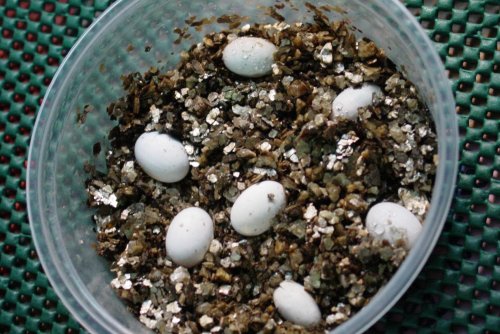sandrachameleon
Chameleon Enthusiast
I've a clutch of NosyBe eggs laid back in September 2009. Historically, I'd always spaced eggs about 2-3 cm (an inch) apart in vemiculite. I was curious to know if egg spacing actually made any significant difference to hatch timing. So this time I had one container with eggs spaced 1-2cm apart, and another where the eggs are right next to one another, even touching.
On Monday, one egg hatched. His neighbouring eggs, about 1 cm (less than half an inch) away, showed no signs of hatching that day, or the next or the next.
Today, Thursday, there is an egg hatching that is in the same container as the first egg to hatch, but its not one of the near neighbours to that first egg. Its on the far side of the container, more than an inch distant.
Also, an egg in another container is now sweating. This one is right next to two eggs, touching one and maybe 5mm from another. Those neighbour eggs show no signs of hatching.
So far, egg spacing doesnt seem to matter.
On Monday, one egg hatched. His neighbouring eggs, about 1 cm (less than half an inch) away, showed no signs of hatching that day, or the next or the next.
Today, Thursday, there is an egg hatching that is in the same container as the first egg to hatch, but its not one of the near neighbours to that first egg. Its on the far side of the container, more than an inch distant.
Also, an egg in another container is now sweating. This one is right next to two eggs, touching one and maybe 5mm from another. Those neighbour eggs show no signs of hatching.
So far, egg spacing doesnt seem to matter.
I'd forgotten how tiny baby panthers are! its a treat to see them emerge and so quickly become active!






